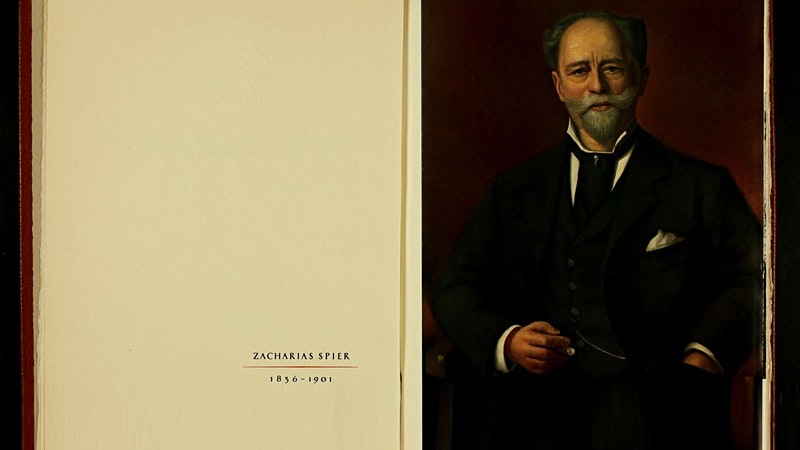The Business of Jewish History
Wed, Oct 13, 2021 2:00 PM - 3:30 PM Eastern Daylight Time (UTC-4)
Register here.
Join us to mark the launch of the LBI’s newest virtual exhibition, Business of Emancipation, with a lecture from Jonathan Zatlin.
About this event
Please note that the Zoom link to the program can be found at the bottom of your registration confirmation email. This information will also be emailed to you via Eventbrite the day before the event at 9am EDT and 30 minutes prior to the event.
This holiday season, give to:
Truth and understanding
The Media Line's intrepid correspondents are in Israel, Gaza, Lebanon, Syria and Pakistan providing first-person reporting.
They all said they cover it.
We see it.
We report with just one agenda: the truth.


Zatlin’s lecture will employ the history of the Wickrather Lederfabrik AG to tell the story of German-Jewish entrepreneurship between 1855 and 1955. The Wickrather’s history began as a rags-to-riches story. The gradual relaxation of legal restrictions on Jewish commercial activity during the nineteenth century made it possible for Zacharias Spier, a journeyman tanner, to transform a small tannery outside of Mönchengladbach into one of Germany’s leading exporters of quality leather goods. Despite racially inflected conflicts with municipal authorities, labor tensions, the disruptions of the First World War, and the economic chaos of the Weimar Republic, the firm continued to prosper under the stewardship of Zacharias’s sons.
All of this changed after 1933, however, as it did for all German Jewish commercial activity. The Spiers were arrested by the Gestapo in 1936 and forced to surrender ownership of the firm; the family members who had fled to the Netherlands together with those remaining in Germany were deported to various concentration camps, where most were murdered. But if the Spier family’s fate is similar to that which befell so many German Jews, the postwar restitution of their company is remarkable for its singularity. Where most German Jews who survived the dictatorship spent years seeking the restitution of their businesses, often in vain, the Spier family recovered their company without delays, conditions, or even lawyers – thanks to Friedrich Carl von Oppenheim of the Bankhaus Sal. Oppenheim, jr.
About the Speaker
Jonathan Zatlin came to BU in 2002, where he has been an active teacher and scholar. He has written widely on the history of German communism, from Marxist economic theory, Soviet-style economic planning, socialist consumer policy, the East German automobile industry, and the treatment of women to popular opinion under communism, the East German secret police, racism in Soviet-style regimes, and the politics of German unification. Zatlin is the author of The Currency of Socialism: Money and Political Culture in East Germany (Cambridge University Press, 2007), which was named a finalist for the President’s Book Award of the Social Science History Association in 2006, and co-edited Selling Modernity: German Advertising in the Twentieth Century (Duke University Press, 2007) with Pamela E. Swett and S. Jonathan Wiesen.
Zatlin’s current research investigates the link between race and economy in modern European history, focusing on the experience of German Jews. He is completing a book entitled Fantasies of Jewish Wealth in Germany, 1790-1990 (under contract with Chicago University Press), which analyzes how economic racism inspires violent assaults on the rights of ownership and citizenship. It aims to provide an alternative account of the Jewish experience in German history by focusing on the economy as a field for the production of violent fantasies about Jews. Through a series of interconnected case studies, it demonstrates that these fantasies did not simply emerge out of an opposition to material reality, but increasingly shaped both economic practice and symbolic understanding of that practice.
Above: Image of Zacharias Spier. Margot Gerson Collection, 1891-2003., 1891. Leo Baeck Institute, AR 6146.

